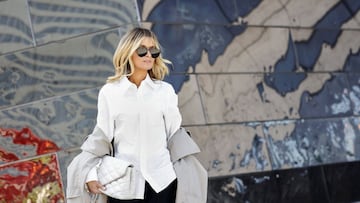Why can’t you wear white after Labor Day? The unwritten rule explained
There is an unwritten rule that you’re to put away your white clothes after the Labor Day holiday, and some theorize that this belief has elitist origins.


Americans are kicking back and enjoying the three-day weekend thanks to the Labor Day holiday on Monday. This break is usually thought of as the last hurrah of the summer season. The annual celebration dates back to the late 1800s when workers staged parades to call for better working conditions and fair pay. The holiday is now celebrated on the first Monday of September each year and brings with it a host of yearly traditions.
One of the most famous is the notion that you should not wear white after Labor Day. But where does this assumed dress code come from and should you be sticking to it this year?
Labor Day signifies the end of summer
The exact origin of the “no white after Labor Day” rule is debatable, but many have put forward theories regarding where it came from. In this instance, the most obvious explanation may be the changing of the seasons, and the transition from a light summer wardrobe to darker, warmer winter clothes.
Miss Manners’ etiquette columnist Judith Martin points out that there was a clear practical reason for wearing white in the summer.
“Not only was there no air-conditioning, but people did not go around in T-shirts and halter tops. They wore what we would now consider fairly formal clothes… And white is of a lighter weight.”
For city-dwellers in the early to mid-20th century, beating the heat was a vital part of fashion choices and white was simply the most practical thing to wear. However, once summer has ended, and bear in mind that Labor Day is traditionally seen as the end of summer, those white clothes are susceptible to rain and muddy conditions.
Historian Charlie Scheips, author of “American Fashion”, points out, “All the magazines and tastemakers were centered in big cities, usually in northern climates that had seasons.”
Did not wearing white become a class identifier?
Wearing lighter clothes in summer is a choice that most of us, even if only subconsciously, tend to make. Darker colors do tend to absorb the heat more and make it a better choice for the cold winter days than a sweltering summer afternoon.
But Valerie Steele, director of the Museum at the Fashion Institute of Technology, explains that “very rarely is there actually a functional reason for a fashion rule,” and argues that the Labor Day white clothing ban may have more to do with style than substance.
For the metropolitan taste-makers wealthy enough to leave the stuffy city for the countryside in the summer months, clothing became a conscious signifier of the seasons. The classic “look of leisure” at beachside resorts was one of white linen and Panama hats.
Steele suggests that refusing to wear white after Labor Day may have been a sign that the wearer was rich enough to reserve the paler colors for summer retreats. She says, “You’re back in the city, back at school, back doing whatever you’re doing in the fall- and so you have a new wardrobe.”
“It [was] insiders trying to keep other people out,” Steele continues, “and outsiders trying to climb in by proving they know the rules.”
Wearing white after the holiday
So should you wear white after Labor Day? In the spirit of defying possibly elitist rules established decades ago, the answer would be a definitive “yes.” But aside from making a (theoretical) statement against the elite, if you think you look best in white or simply love wearing the color, there is no reason why you shouldn’t don your favorite all-white ensemble post-Labor Day.
Rules, especially those involving fashion, were meant to be broken, after all.
Related stories
Get your game on! Whether you’re into NFL touchdowns, NBA buzzer-beaters, world-class soccer goals, or MLB home runs, our app has it all.
Dive into live coverage, expert insights, breaking news, exclusive videos, and more – plus, stay updated on the latest in current affairs and entertainment. Download now for all-access coverage, right at your fingertips – anytime, anywhere.
Complete your personal details to comment